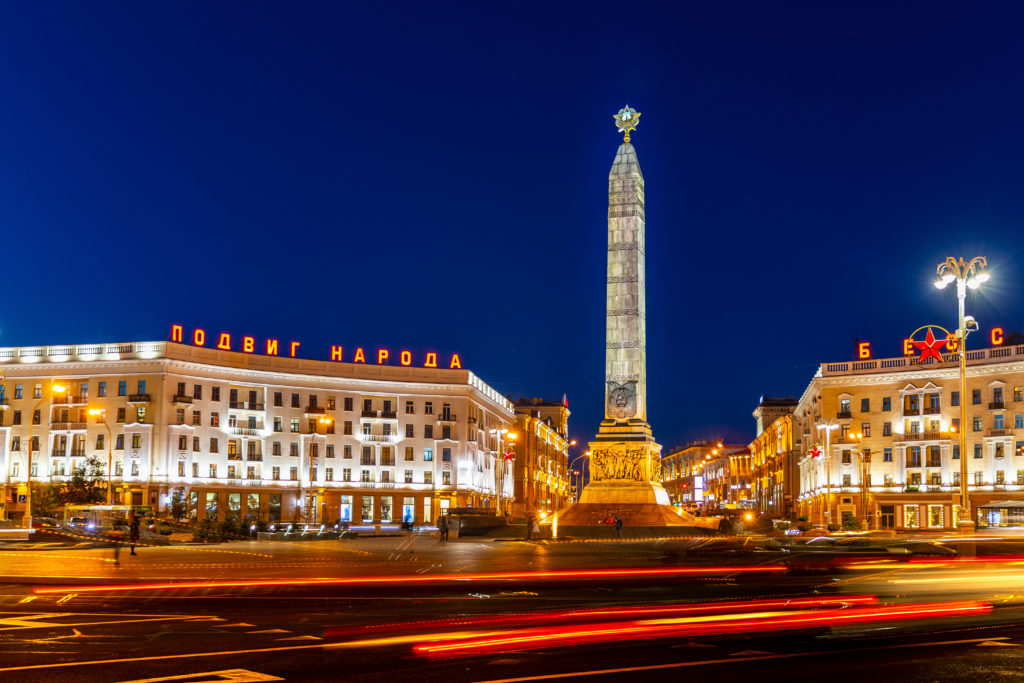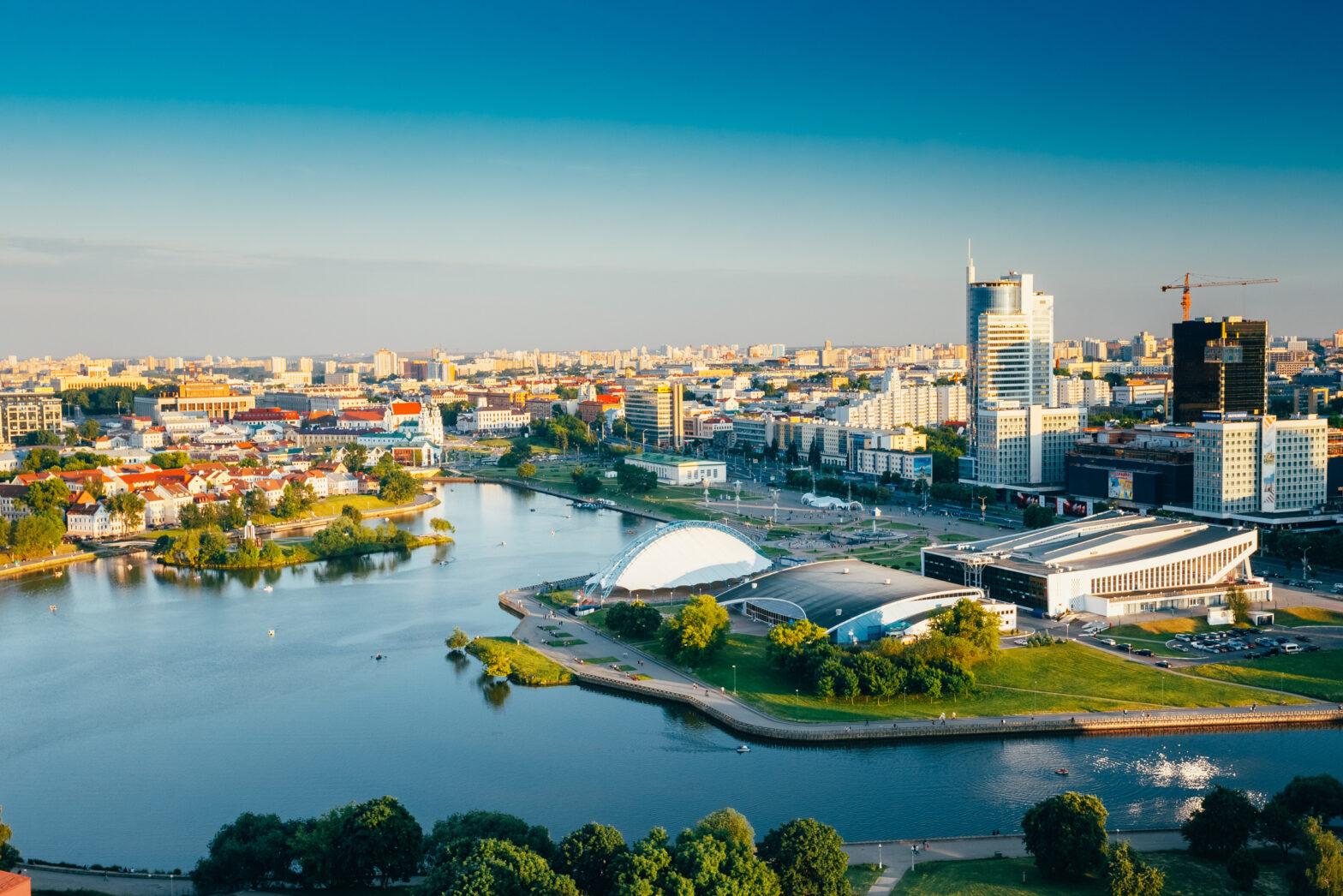Out of all the Soviet Union’s former countries, in many ways, Belarus appears to have changed the least. Its capital city Minsk is dominated by Stalinist architecture. Streets take names from prominent Soviet figures while the city’s main square still houses an enormous monument of Lenin.
Remnants of the old Soviet days are not just aesthetic either. Often referred to as “Europe’s last dictatorship,” in this region, economic and social freedoms are severely lacking. Nor are elections free or fair.
Belarus’ autocratic President Alexander Lukashenko has ruled the country since 1994 while opposition leaders have been known to disappear or be imprisoned. Its central intelligence agency is still called the KGB and the country remains the only nation in Europe to use the death penalty.
Warming to the West
When Lukashenko first came to power, Belarus bucked the capitalist trend of its neighbours. He took the country on a path to “market socialism”. This involved the government keeping a tight grip on infrastructure and utilities. Notably, Lukashenko introduced the “Golden Share” rule, which gave the state the right to intervene in the management of any private enterprise by introducing a preferential share.
A consequence of this economic model has been a strong reliance on Russia. Belarus exports almost half of its goods to Russia. The Belarusian economy also depends on Russia’s energy subsidies and discounted oil and gas prices.
Belarus wants to appeal to the EU
However, this “special relationship” appears to be waning. Recent economic slowdown in Russia, sanctions between Russia and the European Union, tensions in Ukraine, and currency depreciation have all made it a less reliable partner. As such Belarus wants to appeal to the EU more, to do this, it’s moving closer to becoming a market economy.
There have been some notable successes.
In 2015, it was announced that the EU would suspend most of its sanctions against Belarus, following the freeing of the country’s political prisoners. Belarus also introduced a scheme allowing EU citizens to visit for five days without a visa.
According to figures from 2017, the European Union was Belarus’s second-largest trading partner.
Belarus even hosted the 2019 European Games. This was one of the year’s biggest pan-European sporting events: a total of 3,666 athletes from all 50 European National Olympic Committees participated in the games.
‘Belarus signalled to the rest of the continent that it is open for business’
The event served as an opportunity for Belarus to signal to the rest of the continent that it is open for business and to spread the word of its invigorated market economy.
Equality for foreign investors
In 2008, Belarus abolished the Golden Share rule, and, in 2013, it established new laws for investment which guarantee the full equality of rights to foreign investors. It also gives the investor the right to legally appeal against any violation by the state regarding the investor’s rights.
Belarus offers numerous ways for businesses to communicate with the government. The Foreign Investment Advisory Council, the Belarus-EU Business Cooperation Council and the Belarusian Association of Entrepreneurs improve the climate for investments and negotiate between any company and the government.
The National Agency of Investment and Privatization was also created for foreign business. Being the source of current information in regards of investment climate and business opportunities, the agency assists foreign investors in the selection of # partners and investment projects in Belarus and accompanies projects at every step of their implementation, including post-investment support.
Privatisation of property is also developing rapidly in Belarus.
Belarus is ranked 37 among 190 economies in the ease of doing business, according to the latest World Bank annual ratings. The rank of Belarus improved to 37 in 2018 from 38 in 2017. Belarus was also placed among the top 10 countries in implementing business-friendly reforms in the World Bank Group’s Doing Business Report 2017.
“The government’s sustained effort to improve the regulatory environment for businesses has clearly made a positive impact on the county’s Doing Business ranking during the past decade. The challenge today is to use this strong track record of reforms to attract foreign direct investment,” says Young Chul Kim, World Bank country manager. “In order to do this, the government should complement the Doing Business reforms with timely adoption of policies to remove structural constraints to growth.”

Visa requirements
All British national passport holders (except those entering on a diplomatic or official passport) can now enter Belarus for a maximum of 30 days without a visa. However, entry and exit can only be made at Minsk International Airport. Visitors will need to show documentary evidence of medical insurance to the value of €10,000 and funds equivalent to €25 per day.
Those who wish to stay longer than 30 days can apply for a short-term visa (issued for up to 90 days) or a long-term visa (issued for up to one year with the right to stay for 90 days).
In an attempt to promote the IT sector, the government has eliminated the need for visas for foreign high-tech professionals. Further concessions are made in free economic zones and special economic zones (more information found below).
Taxes and incentives
In Belarus, the various taxes are categorised as corporate, customs and personal tax.
For corporate taxes, all companies established in Belarus are obliged to pay 18pc tax on profits of products, goods and services. In custom taxes, there are excise duties on particular alcoholic products, motor oil, cars, fuel and tobacco.
It is important to note that there is no capital gains, tax, inheritance tax or capital gains tax in Belarus.
Belarus offers numerous incentives for businesses. Notably, the country has six free economic zones (FEZs). These zones were created to attract business and offer an enviable array of incentives to members, whether they are local entrepreneurs or foreign investors.
They can be found in Minsk, Gomel, Vitebsk, Grodno, Brest and Mogilev.
Registered businesses wanting to register with a FEZ must make a minimum investment of $1 million but receive the following benefits:
- Tax-free profits on all goods and services for five years, then a 50% tax discount
- 50% discount on VAT on “import substitution goods” – i.e. locally produced goods – manufactured within a FEZ
- No taxes on property owned or leased in the FEZ
- Exempt from payments to National Agriculture Support Fund
- No tax on purchasing vehicles
- No customs duty on raw materials and equipment imported from outside Belarus
- A guarantee that legislation governing firms will not change for seven years
Special economic zone
Further to FEZs, Belarus has also established a special economic zone – the China-Belarus industrial park Great Stone (CBIP).
Although the CBIP was established as a joint enterprise between Belarus and China, it’s meant to appeal to international business — providing you work in telecommunications, pharmaceuticals, chemistry, biotechnologies, machine building, new materials, logistics, e-commerce, big data storage, social and cultural events, or R&D.
Minimum investment is either $5 million or $1m if you work in R&D.
As a special economic zone, occupants pay zero tax on any profits for 10 years. After that, they get a 50pc discount up until 2062.
Companies are exempt from land tax and real estate tax. Income tax for park employees is 9pc compared to 13pc for the rest of the country.
CBIP occupants are also free from paying customs duties and VAT when importing equipment for project implementation.
On top of the tax benefits, special legal treatment applies to areas ranging from administrative issues such as permits and registrations, including a 180-day visa-free regime to FX and capital controls.
A grandfather clause guarantees that current business arrangements will remain in place for 10 years.
Legal requirements for doing business in Belarus
Foreigners are entitled to operate a business in Belarus as either a separate Belarusian legal entity or a representative office of a foreign company, providing they abide by the relevant legal requirements.
First, representatives of foreign companies in Belarus are required by law to provide a copy of their identity document. Foreign legal entities also have to provide proof of their status in accordance with the laws of the country of origin.
If setting up a representative office, a company must be able to provide the following set of documents to the Ministry of Foreign Affairs of Belarus:
- an application form
- copy of the parent company registration in the country of origin
- regulations of a representative office
- power of attorney for the head of the representative office
- power of attorney for the person authorised to conduct business on opening a representative office
- document confirming the payment of the registration fee
The process should not take more than 10 days.
If setting up as a legal entity, Belarus can provide various organisational-legal forms of commercial organisations. However, a special permit is required if your business is in gambling, tobacco, alcohol or healthcare.






